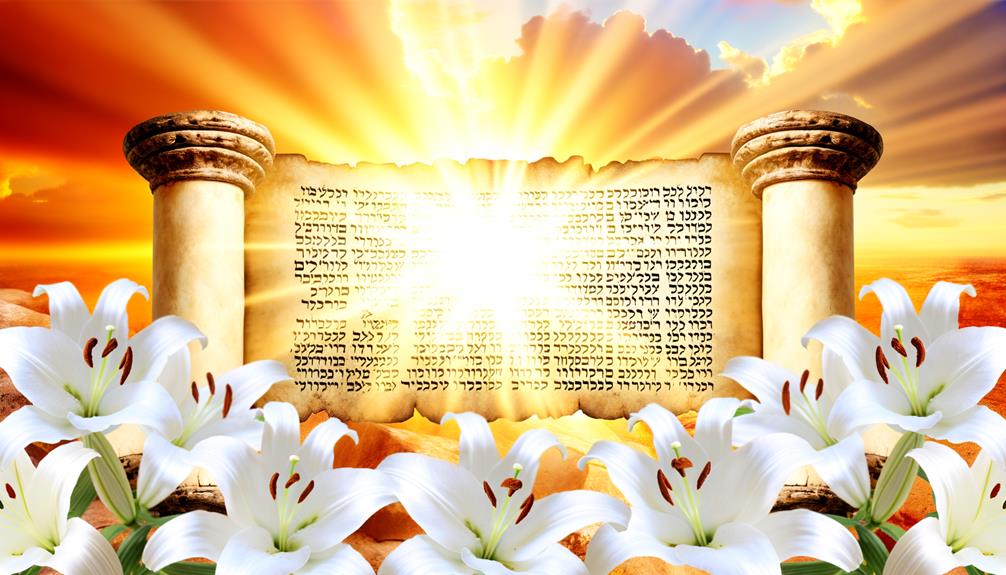Haggai Name Meaning in Hebrew
Haggai's name, derived from the Hebrew root 'ḥgg,' means "to celebrate" or "to make a pilgrimage." This carries deep historical and theological significance. Haggai was a prophet who exhorted the Jewish community to rebuild the Temple after their exile.
His name reflects joy and festival, linking him to themes of worship and covenant fidelity. By focusing on the Temple's reconstruction, Haggai emphasized God's continual presence and the importance of obedience for communal prosperity.
The name embodies spiritual renewal and dedication, resonating through Jewish tradition and modern interpretations. To uncover more, explore Haggai's impactful legacy.

Key Takeaways
- Haggai's name in Hebrew is derived from the root 'ḥgg'.
- The name Haggai means 'to celebrate' or 'to make a pilgrimage'.
- It reflects themes of festivity and worship.
- Haggai's name symbolizes joyfulness in Jewish festivals.
- The name offers insights into historical and theological significance.
Etymology of Haggai
The name Haggai, derived from the Hebrew root 'ḥgg,' which means 'to celebrate' or 'to make a pilgrimage,' offers profound insights into its historical and theological significance.
When you explore the etymology, you uncover layers of meaning tied to Jewish traditions and religious practices. The root 'ḥgg' suggests a connection to festivity and worship, reflecting the importance of communal and spiritual gatherings.
This name wasn't chosen lightly; it encapsulates a sense of purpose and devotion. By understanding the etymology, you gain a deeper appreciation of Haggai's role in guiding and inspiring the Jewish people during pivotal moments in their history.
The linguistic roots emphasize themes of joy, reverence, and collective faith, enriching your understanding of this significant figure.
Biblical References
When you explore Haggai's role in the Bible, you'll find a prophet deeply involved in motivating the Jewish community to reconstruct the Temple after the Babylonian exile.
His messages, portrayed as direct communications from God, aimed to reignite the people's spiritual zeal and commitment to their faith.
These divine directives emphasize the importance of the Temple as a symbol of God's presence and a focal point for worship.
Haggai's Prophetic Role
Haggai frequently emerges in the biblical narrative as a pivotal prophet whose messages were instrumental in urging the Israelites to rebuild the Temple in Jerusalem, as recorded in the Book of Haggai.
You can see his profound impact in Haggai 1:1-15, where he confronts the people's misplaced priorities. His prophecies occur during the reign of Persian King Darius, highlighting a specific historical context post-Babylonian exile.
Haggai emphasizes covenant faithfulness, urging a return to Yahweh's commands. He insists the Temple's reconstruction symbolizes not just physical restoration but spiritual renewal.
You'll find his theological insight profound as he connects the people's prosperity directly to their obedience to God's will, making Haggai's role indispensable for understanding Israel's spiritual journey.
Temple Reconstruction Motivation
Recognizing Haggai's strong call to action, you see his emphasis on the spiritual and communal significance of rebuilding the Temple in passages like Haggai 1:2-4, where the prophet challenges the Israelites to reconsider their priorities and align them with Yahweh's commands.
The historical context reveals a post-exilic community struggling to reestablish itself. Haggai urges them to stop focusing on their own homes and instead rebuild Yahweh's house, highlighting the theological insight that the Temple is central to their identity and relationship with God.
Divine Messages Delivered
In delivering Yahweh's messages, the prophet Haggai conveys divine instructions and assurances that challenge the Israelites to renew their covenantal faithfulness and trust in God's provision, as seen in passages like Haggai 2:4-5. Here, Haggai emphasizes the importance of obedience and the promise of God's presence among His people.
You can explore Haggai's divine messages through these key points:
- Encouragement to rebuild the Temple: Reflects God's desire to dwell among His people.
- Promise of blessing: Conditional on their obedience and dedication.
- Assurance of divine presence: Reiterated in Haggai 1:13.
- Warning against neglect: Highlights consequences of prioritizing personal comfort over divine duties.
- Call to reflect on priorities: Encourages self-examination and spiritual renewal.
Understanding these messages offers a deeper grasp of Haggai's prophetic role and theological significance.
Historical Significance
Understanding Haggai's historical significance requires examining the pivotal role he played in the post-exilic period of Jewish history. As a prophet, Haggai's messages spurred the Jewish people to rebuild the Second Temple, an essential act for their cultural and spiritual revival. His exhortations focused on prioritizing God's house, which had been neglected. By doing so, Haggai helped re-establish religious practices and communal identity.
| Aspect | Details |
|---|---|
| Mission | Encouraged rebuilding of the Second Temple |
| Time Period | Post-exilic period (after 538 BCE) |
| Impact | Reinvigorated Jewish religious life and cultural identity |
Haggai's prophecies emphasized faithfulness to God and the significant blessings that would follow. This period marked a turning point, embedding his influence deeply in Jewish theological history.
Linguistic Roots
When you explore the linguistic roots of the name Haggai, you find its etymology deeply embedded in the Hebrew language. Haggai is derived from the Hebrew word “chag,” which means “feast” or “festival,” reflecting a sense of celebration associated with this name. Similarly, when considering the habakkuk name significance in hebrew, it becomes evident that both names carry rich meanings linked to their cultural and religious contexts. This connection emphasizes the importance of names in conveying deeper narratives within the Hebrew tradition.
The name Haggai (חַגַּי) is derived from the Hebrew word 'chag,' which means 'festival' or 'celebration,' reflecting a sense of joy and festivity.
This etymological context enriches its biblical significance, as Haggai's prophetic messages often focused on the restoration and renewal of the temple, symbolizing a return to communal worship and divine festivity.
Etymology of Haggai
The name Haggai, derived from the Hebrew root חַגַּי (ḥgg), meaning 'to celebrate' or 'festive,' reflects a rich tapestry of linguistic and cultural significance in ancient Judaic tradition. By understanding its etymology, you can appreciate the depth and nuance embedded in this name.
- Historical Roots: The name dates back to post-exilic times, highlighting the return and renewal of Jewish identity.
- Linguistic Connection: The root ḥgg is linked to Jewish festivals, emphasizing joy and communal gatherings.
- Theological Implications: Haggai's name underscores themes of divine celebration and restoration.
- Cultural Resonance: It mirrors the Jewish emphasis on holidays and sacred observances.
- Scriptural Significance: The prophetic book of Haggai in the Bible carries this celebratory tone, urging the rebuilding of the Temple.
Understanding Haggai's etymology offers valuable insight into its profound heritage.
Hebrew Language Context
Delving into the Hebrew language context, you'll find that the linguistic roots of Haggai offer a nuanced perspective on its celebratory and festive connotations. The name Haggai stems from the Hebrew word "חג" (chag), meaning "festival" or "feast." This connection underscores a sense of joy and communal celebration.
| Hebrew Root | English Translation |
|---|---|
| חַגַּי (Haggai) | My Festival |
| חַג (Chag) | Festival |
| חָגַג (Chagag) | To Celebrate |
| חָג (Chag) | Feast |
In historical terms, naming conventions carried significant theological weight, reflecting the cultural and religious milieu. By naming a child Haggai, parents invoked themes of divine joy and festivity, hoping the name would imbue their child's life with these qualities. This insight enriches your understanding of the name's depth beyond its literal meaning.
Biblical Name Significance
Understanding the name Haggai's linguistic roots illuminates its profound biblical significance, reflecting themes of divine joy and celebration embedded within its very syllables. In Hebrew, Haggai (חַגַּי) stems from the word 'chag' (חַג), meaning 'festival' or 'celebration.' This etymology reveals a deeper theological resonance:
- Divine Joy: Emphasizes God's delight in His people.
- Restoration: Symbolizes the hope and renewal in post-exilic Israel.
- Prophetic Voice: Highlights Haggai's role in encouraging the rebuilding of the Temple.
- Covenantal Promise: Reflects God's ongoing commitment to His covenant.
- Spiritual Renewal: Aligns with the festive nature of worship and divine presence.
Understanding these facets helps you appreciate Haggai's importance within the biblical narrative.
Haggai in Jewish Tradition
In Jewish tradition, Haggai's prophetic messages play an important role in encouraging the Israelites to rebuild the Second Temple, highlighting themes of faith, obedience, and divine promise. Haggai's words came at an essential time when the Jewish people returned from Babylonian exile. He emphasized the importance of prioritizing the Temple's reconstruction over personal gain, urging them to align their actions with God's will. This call to action was not just about physical rebuilding but spiritual renewal.
| Aspect | Description |
|---|---|
| Historical Context | Post-exile period, around 520 BCE |
| Key Themes | Faith, obedience, divine promise |
| Impact on Israelites | Motivated to rebuild the Second Temple |
| Theological Insight | Demonstrates God's continued presence and support for His chosen people |
Understanding Haggai's role helps you grasp the profound dedication to faith in Jewish history.
Symbolism and Meanings
The name Haggai, which means 'my feast' or 'festive' in Hebrew, carries deep symbolic significance reflecting themes of joy and divine celebration in Jewish tradition. This name isn't just a simple label; it encapsulates profound theological and historical insights.
You'll find that Haggai's symbolism extends beyond mere festivity, touching on various aspects of spiritual life and community.
- Divine Appointment: Haggai was a prophet who urged the rebuilding of the Temple, symbolizing renewed covenant with God.
- Joy and Celebration: The name itself embodies joyfulness, integral to Jewish festivals.
- Restoration: It signifies hope and renewal after exile.
- Spiritual Awakening: Haggai's messages often called for spiritual revival.
- Communal Unity: Encourages collective effort in worship and obedience.
Understanding these layers enriches your comprehension of Jewish heritage.
Haggai in Modern Culture
Today, Haggai's name and its rich connotations continue to resonate within modern Jewish culture, serving as a symbol of spiritual renewal and communal solidarity. You'll find that Haggai's prophetic messages, emphasizing the rebuilding of the Second Temple, inspire contemporary discussions about faith and perseverance.
His name, meaning 'my festival' or 'festive,' evokes themes of joy and celebration, particularly during Jewish holidays. This connection underscores the importance of unity and devotion in communal worship. Theologically, Haggai's call for prioritizing spiritual commitments over material concerns remains relevant, urging modern Jews to reflect on their values and actions.
Famous Namesakes
Haggai's name has been borne by various significant figures throughout history, each adding unique layers to its already profound theological and cultural resonance. The foremost Haggai, a prophet during the Second Temple period, urged the returnees from Babylon to rebuild the temple. His messages were laden with divine urgency and hope.
Consider these notable Haggais:
- Haggai the Prophet: Central to post-exilic Jewish history.
- Haggai Ben-David: A 20th-century Israeli writer and intellectual.
- Haggai Elrich: Renowned historian specializing in Middle Eastern studies.
- Haggai Segal: Influential Israeli journalist and political commentator.
- Haggai Carmon: International lawyer and author.
Each individual, in their way, reflects the enduring spiritual and cultural significance of the name, bridging ancient wisdom with contemporary relevance.
Celebrating Haggai Today
In reflecting upon the notable individuals named Haggai, you can see how the name continues to be celebrated today through various cultural, religious, and academic contributions that honor its rich heritage. Haggai's enduring legacy is observed in festivals, literature, and theological studies. Here's a snapshot:
| Aspect | Example | Significance |
|---|---|---|
| Cultural | Jewish festivals | Remembrance of prophetic messages |
| Religious | Synagogue readings | Reinforcement of faith and community values |
| Academic | Biblical scholarship | In-depth study of Haggai's prophecies |
| Literature | Modern interpretations in books | Continuation of Haggai's influence in society |
You're encouraged to explore these avenues to fully appreciate how Haggai's name is honored and remembered, creating a bridge between past and present.
Conclusion
In exploring the name Haggai, you've delved into rich etymology, historical significance, and theological depth.
Significantly, Haggai appears 12 times in the Hebrew Bible, emphasizing his prophetic influence.
This name, rooted in joyous celebration, still resonates in Jewish tradition and modern culture.
Understanding Haggai's intricate layers enriches your appreciation of its lasting impact.
From ancient scriptures to contemporary namesakes, Haggai's legacy continues to inspire and evoke profound spiritual reflection.






